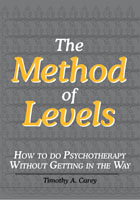|
Kalen Hammann
I've just finished the Method of Levels, and I'm astonished, delighted, and
inspired. I was a psychotherapist for many years, using a variety of approaches
(predominantly Gestalt Therapy, several versions of family therapy, and more recently
Psychology of Mind), and while my clients were often happy with the results, I
frequently wasn't. My fundamental dissatisfaction arose from the fact that I never
knew WHY we were successful when we were, and what had gone wrong or failed to
go right when we weren't. Now I think maybe at last I know.
Timothy Carey must be a delightful person. He's
clear, enthusiastic without being overwhelming, and passionate about the promise
of Perceptual Control Theory and the Method of Levels without sounding in the
least like a True Believer. He says essentially that he'd drop it all in a minute
if something demonstrably better came along, and I believe him. His book is a
remarkable synthesis of scientifically based, rigorous thinking on the one-hand
and human caring, openness, wonder, and plain common sense on the other.
I found the book entrancing as I was led effortlessly
from step to deeper step in my understanding -- well, effortlessly except for
the chapter in which Carey delves most deeply into the Perceptual Control Theoretical
underpinnings of the Method, which should come with a sign indicating how different
it is from all the chapters which precede and follow it ("Warning! Swamp
ahead! Enter at your own risk, and be prepared for some tougher slogging for a
ways. But you'll probably find it's worth it!") In fact, once I recalibrated
for the extra density of the prose, I found that chapter, too, clear and easy
to follow, and helpful in understanding the rest of the book. But it WAS a bit
of a shock at first, and made the transparent lucidity of the rest of the book
even more impressive by contrast.
Anyhow, there's a lot to like in this book: a truly
revolutionary approach to and understanding of the psychotherapeutic process,
a lot of terrific examples of what a MOL therapist might say (and clear explanations
of why the specific words or moves don't matter but the underlying attitude the
therapist takes matters decisively), quick examples of the kinds of issues clients
might raise (I like Tim's use of a huge variety of people's names to keep the
examples multiculturally human), superb summaries and intriguing "coming
attractions."
I'll be very interested to see how openly experienced
therapists of various persuasions receive this work. In particular, I'll be interested
to see whether it's just "engineering types" like Powers, Carey - and
ME! - who are drawn to the rigor of this approach. (My wife was very turned off
by the connotations of the very word "control" that lies at the base
of the theory. Maybe others will be too?) I HOPE it's embraced far and wide: the
human race is likely to be much the better for it.
Thanks and kudos to Dag Forssell, Bruce Nevin,
and of course Tim Carey for the labor of love that obviously lies behind this
wonderful book!
Kalen Hammann, Owls Head, Maine, February 15, 2006
Kalen Hammann, Ph.D., founder of ReConnecting
Works
workshop leader, corporate trainer, psychotherapist, and executive coach
"Kalen Hammann's work represents the best of neuropsychology, with a
strong dose of common sense."
|

